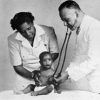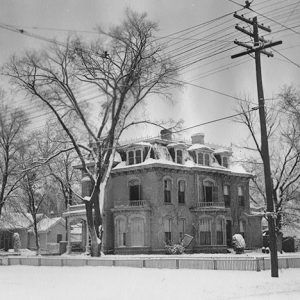calsfoundation@cals.org
Elias Rector DuVal (1836–1885)
In the late nineteenth century, physician Elias Rector DuVal (sometimes rendered Duval) was a leader in the drive to modernize medicine in Arkansas. In the 1870s, he cofounded the Arkansas State Medical Association (ASMA) and the Arkansas Medical Society (AMS).
E. R. DuVal was born on August 13, 1836, in Fort Smith (Sebastian County) to William DuVal, who was a trader, and his wife, Harriet Tabitha Doddridge DuVal. The family included three sisters and two brothers; one brother, Benjamin, later became a leader in the Arkansas General Assembly. In 1835, DuVal’s sister Catherine DuVal married Elias Rector. Rector was a U.S. marshal for the Western District of Arkansas and Indian Territory and later served as superintendent of Indian Affairs.
Educated in the local schools, DuVal graduated from Arkansas College in Fayetteville (Washington County) in 1854. After college, he attended Louisville Medical School in Kentucky for two years. In 1858, he graduated from Philadelphia’s University of Pennsylvania Medical School and served as a U.S. army surgeon in New Mexico Territory. In 1859, he returned to Fort Smith and began practicing medicine.
In 1860, he married Angela Medora Dibrell of Van Buren (Crawford County), who was a sister of James A. Dibrell Jr. The couple had five children.
From 1861 to 1865, he served as a Confederate army surgeon. He saw action at the Battle of Prairie Grove and served in the Trans-Mississippi Department’s Medical Bureau, which was headquartered in Marshall, Texas. After the war, he resumed practicing medicine in Fort Smith.
When cholera struck Fort Smith in 1866, DuVal, as a member of the city health board, responded to the outbreak. In Cholera as It Appeared in Fort Smith in the Fall of 1866, published in 1867, he reported that the health board “address[ed]… the citizens,” and that the city “was cleansed.”
In the 1870s, as Arkansas’s regular physicians began to engage in professional organizing and advocacy, he emerged as a leader among his colleagues. About 1870, he cofounded the Sebastian County Medical Society and served as its president from 1871 to 1878.
After cofounding the Arkansas State Medical Association in 1870, he served as the organization’s president in 1874. At the ASMA’s annual meeting in 1874, he called for the passage of a criminal abortion law and urged members to support such advances as the creation of a state board of health, compulsory vaccination, birth and death registration, and the regulation of medical practice and drugs. Many of the policies he proposed in 1874 became part of modern medicine in Arkansas.
In 1873, he served on the ASMA committee that ruled against Hot Springs (Garland County) physician Almon Brooks’s membership in the ASMA. At the ASMA’s annual meeting in 1874, the still-unresolved Brooks controversy prompted Duval and other members to withdraw from the ASMA.
After cofounding the Arkansas Medical Society in 1875, he served on committees within the organization. As a member of the AMS’s judicial council from 1875 to 1885, he served alongside W. B. Welch and addressed ethical issues within the profession. From 1880 to 1881, he served, again alongside Welch, on the Board of Visitors to the Arkansas Industrial University medical department, now the University of Arkansas for Medical Sciences (UAMS).
When yellow fever struck Memphis, Tennessee, in 1879, Arkansas physicians sprang into action. DuVal served as a member of the unofficial state board of health and as president of Fort Smith’s health board. In August 1879, he and a fellow state health board member traveled to Cairo, Illinois, and met with the National Board of Health to discuss quarantine measures. At his initiation, the state health board resolved to “cooperate with all [city health] boards” to prevent the spread of disease.
DuVal died on October 7, 1885, in Fort Smith. The AMS eulogized him as a physician “who practiced… upon the most elevated plane of ethics.” He is buried in Oak Cemetery in Fort Smith.
For additional information:
Baird, W. David. Medical Education in Arkansas, 1879–1978. Memphis: Memphis State University Press, 1978.
Dibrell-Sparks-DuVal-Rector Family Papers. Center for Arkansas History and Culture. University of Arkansas at Little Rock, Little Rock, Arkansas.
DuVal, Elias R. Cholera as It Appeared in Fort Smith, Arkansas in the Fall of 1866. Fort Smith, AR: Herald Printing, 1867.
———. “Presidential Address.” Transactions of the Arkansas Medical Society 5 (1874): 13–21.
DuVal Family Papers. Butler Center for Arkansas Studies. Central Arkansas Library System, Little Rock, Arkansas.
“Elias R. DuVal.” Transactions of the Arkansas Medical Society 11 (1886): 27–28.
History of Northwest Arkansas. Chicago: Goodspeed Publishing Company, 1889.
Linthicum, D. A. “Report of the State Board of Health.” Transactions of the Arkansas Medical Society 5 (1880): 61–66.
Martin, Amelia Whitaker. Physicians and Medicine: Crawford and Sebastian Counties, Arkansas, 1817–1976. Fort Smith, AR: Sebastian County Medical Society, 1977.
“Proceedings of the Board of Health.” Fort Smith New Era, July 16, 1879, p. 3.
“Report of the Board of Visitors.” Transactions of the Arkansas Medical Society 6 (1881): 16.
“Sebastian County Delegates.” Transactions of the Arkansas Medical Society 2 (1871): 3.
Singleton, E. Mitchell. “Hot Springs Physicians and the Formation of the Arkansas Medical Society.” The Record (2012): 65–68.
Melanie K. Welch
Mayflower, Arkansas







Comments
No comments on this entry yet.